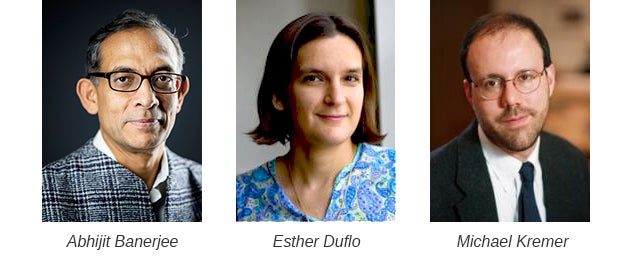Abhijit Banerjee, Esther Duflo, and Michael Kremer Awarded Nobel Prize in 2019 for Research on Economic Development
Abhijit Banerjee, Esther Duflo, and Michael Kremer were awarded the 2019 Nobel Memorial Prize in Economic Sciences for studies in development economics and global poverty that championed randomized controlled trials as a methodology for analyzing how a wide range of policy interventions — in health, education, credit markets, and local governance, among others — can contribute to poverty alleviation.
The laureates' work "has considerably improved our ability to fight global poverty. In just two decades, their new experiment-based approach has transformed development economics," the Royal Swedish Academy of Sciences said in a statement announcing the award. Their central contribution is their finding that these questions "are often best answered via carefully designed experiments among the people who are most affected.
At the time of the award, Banerjee was the Ford Foundation International Professor of Economics at MIT and a codirector of the Abdul Latif Jameel Poverty Action Lab (J-PAL). Duflo was the Abdul Latif Jameel Professor of Poverty Alleviation and Development Economics at MIT and a codirector of J-PAL. Kremer was the Gates Professor of Developing Societies at Harvard University. All were affiliates of the NBER’s Development Economics Program. Banerjee was also affiliated with the Economic Fluctuations and Growth (EFG) Program, Duflo with the Economics of Aging, Children (CH), and Economics of Education (ED) programs, and Kremer with the CH, EFG, and ED programs.
More information on these Nobel laureates



